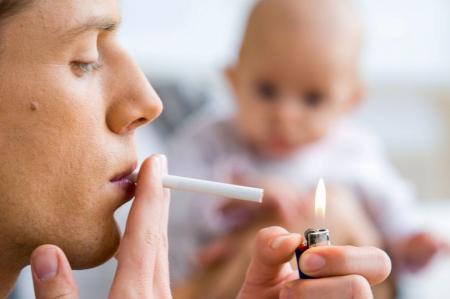
Tabacco smoke is a significant threat to a child's brain development
Children who are exposed to tobacco smoke at home are prone to antisocial behaviour, aggression and are more likely to drop out of school , a study suggests.
Parents who smoke where their young children live and play inadvertently expose them to second and third-hand smoke at a critical time in their brain’s development.
Now, researchers from the University of Montreal have discovered a link between exposure to tobacco smoke and antisocial behaviour, criminal offences, thefts, destruction of property and refusal to comply with authority.
Professor Linda Pagani, who led the study, said: “Young children have little control over their exposure to household tobacco smoke, which is considered toxic to the brain at a time when its development is exponential.
“The detection of early environmental factors that influence later child well-being represents an important target for individual and community health.
“Parents who smoke near where their children live and play often inadvertently expose them to second and third hand smoke.
“It was already known that environmental smoke places children at risk of short and long-term health problems.
“However, now for the first time, we have compelling evidence which suggests other dangers to developing brain systems that govern behavioural decisions, social and emotional life, and cognitive functioning.”

Cigarettes contain harmful neurotoxins (Photo: Getty)
Prof Pagani’s team looked at data from a long study of children born in Quebec, Canada, in 1997 and 1998.
Each year, parents of more than 1,000 children monitored in the study reported whether their children had been exposed to smoke between the ages of 18 months and seven-and-a-half.
Around 60 per cent said their children had never been exposed to tobacco smoke.
A quarter (27) said their children had intermittent exposure to smoke, while 13 per cent reported chronic exposure.
The team then sought to see if there was a link between early exposure and later child deviance.
Prof Pagani said: “Our goal was to eliminate any pre-existing conditions of the children or families that could shed a different light on our results or serve as alternative explanations.”
READ MORE
They found that children exposed to smoke were at a greater risk of antisocial behaviour, including a proactive intent to harm others, a lack of prosocial feelings, and violation of social norms.
Aggression, criminal offences, theft, refusal to comply with authority, and destruction of property were also found to be higher among those who had been exposed to smoke.
In later childhood, antisocial behavior is often associated with academic problems, the study said.
Prof Pagani said: “These long-term associations should encourage policy-makers and public health professionals to raise awareness among parents about the developmental risks of second hand smoke exposure.
“In addition, schools could incorporate this knowledge into curricula at all grade levels in an effort to prevent further exposure to neurotoxins.”
